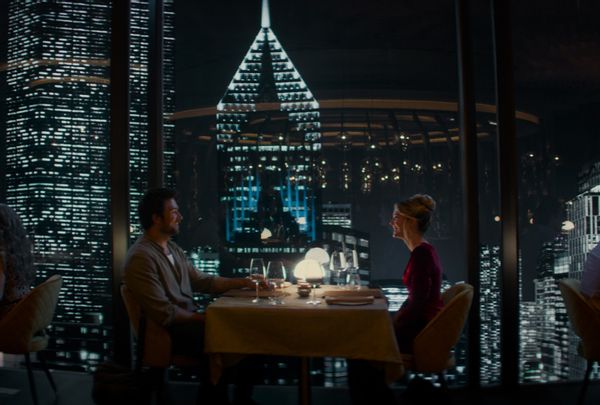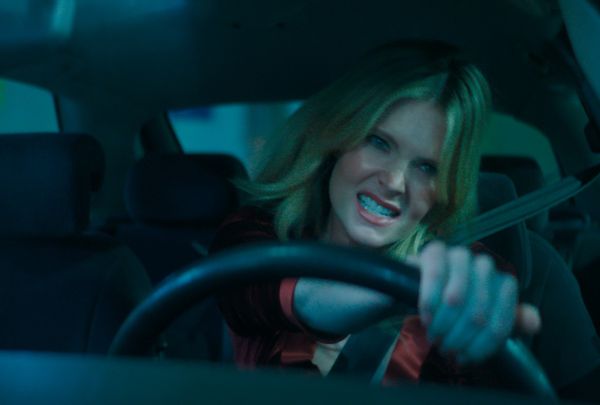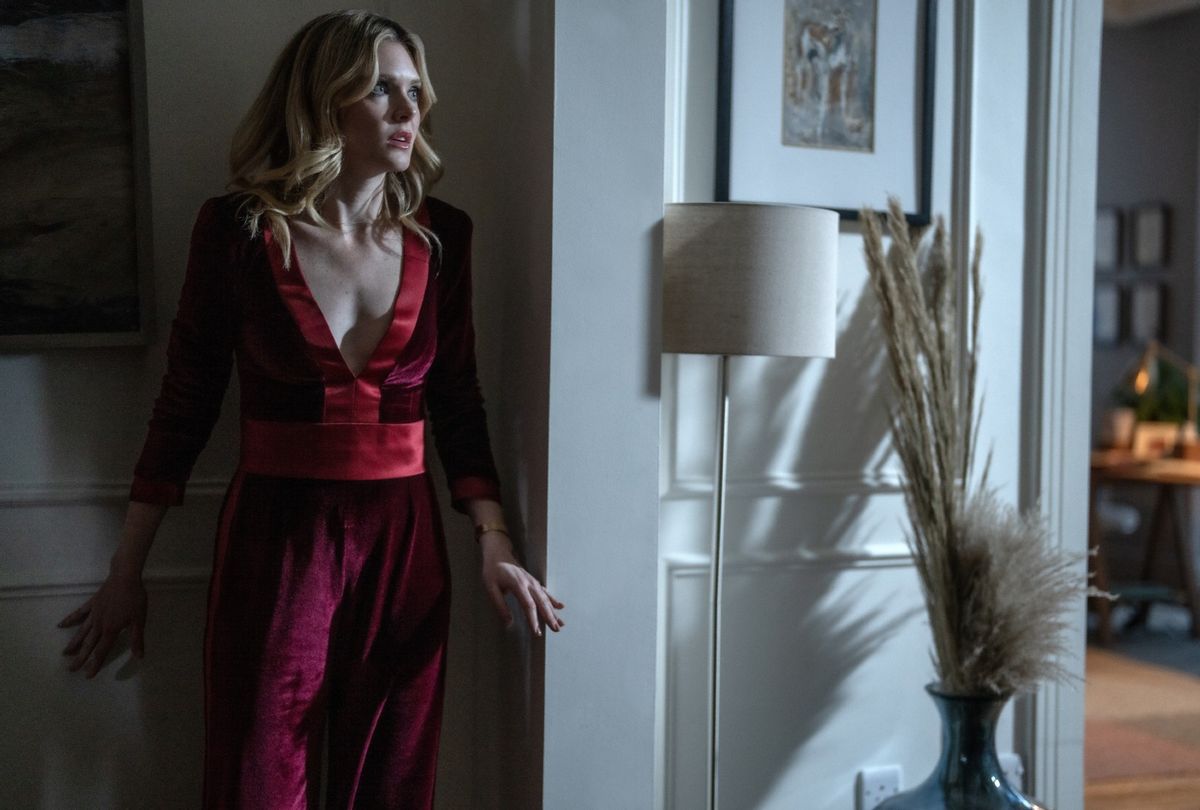At the outset of the immensely entertaining new thriller “Drop” — director Christopher Landon’s latest work for the hit-or-miss Blumhouse studio — Violet (Meghann Fahy), a therapist specializing in treating survivors of domestic abuse, is having a difficult time breaking through to her client. The woman across from her is tormented by the memories of what she endured and, more acutely, how low and empty the abuse made her life feel. The fact that Violet is trying to conduct a productive therapy session over Zoom doesn’t exactly help, either. Technology’s not doing anything but getting in her way, so Violet quickly comes up with an idea that uses the tools at her disposal. She asks her client to turn on “self-view” and turn off Violet’s window so that the only person her patient can see on the screen is herself. “Look at the woman in front of you,” Violet instructs her. “Try to tell her that she’s worthless.”
To Violet’s surprise, this method works. At least for this session, her tactic has quelled her patient’s self-contempt. It’s a silent affirmation that Violet — a fellow survivor of domestic abuse — is doing good work and a reminder to heed her own words. She is not a burden walking the Earth. She has a limitless supply of power and agency; all she needs to do is call on it.
Violet never becomes the conventional image of a woman subjected to a man’s torture. She’s as capable and crafty in a real-life bind as she is in her sessions, and Fahy’s movie-star-making performance is a gripping glimpse of a woman in full control.
Landon’s film, co-written by Jillian Jacobs and Chris Roach, takes excellent care to be economical. This is, after all, a studio crowd-pleaser that’s got to get the job done in 95 minutes. However, Jacobs and Roach refuse to sacrifice Violet’s character for the film’s expediency. This opening scene might be quick and straightforward, but it’s also deceptively informative. In just about 120 seconds, viewers learn that Violet is not only intensely caring but clever enough to think of cunning, new approaches in a short amount of time when one method falls flat. For “Drop,” a film that deftly balances modern-day tech with the thriller subgenre’s classic twists, establishing Violet’s ingenuity in a sticky situation is integral to ensure every viewer has a great time.
Violet would love some entertainment of her own, too. She’s so starved for it that she’s finally booked her long-awaited first date with Henry (Brandon Sklenar), a handsome and incredibly patient suitor she’s been chatting with on a dating app for the past three months. After a long time wrestling with the trauma of her last relationship, Violet decides to go for it and leaves her son Toby (Jacob Robinson) in the doting care of her sister, Jen (Violett Beane). She’ll keep her phone on in case Jen needs her, and they’ve got security cameras throughout the house that feed to an app on her device; everything will be fine.
 Henry (Brandon Sklenar) and Violet (Meghann Fahy) in "Drop" (Bernard Walsh/Universal Pictures). Unfortunately, Violet will have no such luck. Her first date with Henry quickly devolves into a living nightmare — and not just the kind where you find out that the person sitting across from you is, like, really into deadlifting. When she sits down to dinner, Violet gets caught up in a game of digital cat-and-mouse that threatens her future romantic prospects and her son’s safety. But with Jacobs and Roach’s sharp character writing, Violet never becomes the conventional image of a woman subjected to a man’s torture. She’s as capable and crafty in a real-life bind as she is in her sessions, and Fahy’s movie-star-making performance is a gripping glimpse of a woman in full control.
Henry (Brandon Sklenar) and Violet (Meghann Fahy) in "Drop" (Bernard Walsh/Universal Pictures). Unfortunately, Violet will have no such luck. Her first date with Henry quickly devolves into a living nightmare — and not just the kind where you find out that the person sitting across from you is, like, really into deadlifting. When she sits down to dinner, Violet gets caught up in a game of digital cat-and-mouse that threatens her future romantic prospects and her son’s safety. But with Jacobs and Roach’s sharp character writing, Violet never becomes the conventional image of a woman subjected to a man’s torture. She’s as capable and crafty in a real-life bind as she is in her sessions, and Fahy’s movie-star-making performance is a gripping glimpse of a woman in full control.
If your mind is still lingering on the film's title and how it could be related to this almost retro-style thriller, one that — get this — actually thrills, “Drop” refers to the series of AirDropped photos and messages that Violet begins to receive during her date. (Or, in this movie’s case, “DigiDrops”; that Apple licensing money will eat up the budget.) As if Violet wasn’t nervous enough, her pleasant conversation with Henry is interrupted by trite memes covered in Impact-font text. That’d be a jump scare as it is, but the images blowing up Violet’s phone quickly become unnervingly specific and personal. Henry assures her it’s probably just a prank some nearby high school kids are playing on her while they eat a fancy dinner before heading to their prom. And because chivalry is not dead, Henry even goes so far as to help Violet weed out other potential suspects.
Want a daily wrap-up of all the news and commentary Salon has to offer? Subscribe to our morning newsletter, Crash Course.
Speaking from experience, receiving a bunch of drops while out in public is not fun. I, too, was the victim of some high school kids sitting on the other side of a train car not too long ago, who kept sending me random images as I tried to pass the time by aimlessly scrolling on my phone. They were dropping images so fast and frequently that, as soon as I declined one, another one would be on my screen half a second later. I kept my face unchanged so they wouldn’t get any kicks from my annoyance until I remembered that I didn't have to deal with this at all. With two swipes of my thumb, I turned my Bluetooth off. My device left their range and the torment ended.
That Violet could conceivably do the same thing is the film’s biggest weakness, a plot hole that could swallow viewers who can’t suspend disbelief. Violet’s already pretty annoyed by the drops before they become threatening, and something as simple as tapping her phone to turn the Bluetooth off could’ve saved her a whole lot of trouble. Jacobs and Roach have written such a quick-witted character that it seems implausible Violet wouldn’t think of this herself, even if she was overwhelmed by the sudden collision of her nerves and trauma. But to Landon’s credit, his direction keeps the pace swift and the tension mounting. (Albeit with some shot/reverse shot conversations that are whiplash-inducing.) And once Fahy digs into Violet’s strength under pressure, “Drop” shakes off its most glaring flaw.
 Meghann Fahy as Violet in "Drop" (Universal Pictures). It helps, too, that Henry is such a charmer. In a movie where most would expect the romantic co-lead to turn out to be the villain, Sklenar’s hard leaning into the affable good-guy persona removes his character from the suspect list early on. But there are plenty of others around the penthouse restaurant they’ve chosen for this outing: A shifty couple on a blind date, an overly sweet bartender, a handsy piano player and a skulking man who’s “waiting for his sister.” There’s also Violet and Henry’s waiter, Matt, played by the scene-stealing Jeffery Self. Perhaps his anecdotes about doing improv at Second City are a brilliant diversion, but probably not. They do, however, inject some fantastic comedic relief to cut Landon’s tension; if Fahy is the film’s star, Self is its supernova.
Meghann Fahy as Violet in "Drop" (Universal Pictures). It helps, too, that Henry is such a charmer. In a movie where most would expect the romantic co-lead to turn out to be the villain, Sklenar’s hard leaning into the affable good-guy persona removes his character from the suspect list early on. But there are plenty of others around the penthouse restaurant they’ve chosen for this outing: A shifty couple on a blind date, an overly sweet bartender, a handsy piano player and a skulking man who’s “waiting for his sister.” There’s also Violet and Henry’s waiter, Matt, played by the scene-stealing Jeffery Self. Perhaps his anecdotes about doing improv at Second City are a brilliant diversion, but probably not. They do, however, inject some fantastic comedic relief to cut Landon’s tension; if Fahy is the film’s star, Self is its supernova.
So many characters in one place means that Landon can use the single confined space to its maximum potential. Amid the relentless drops on her phone and texts threatening to hurt her sister and son, Violet trots around the luxurious eatery, looking for clues, security camera blind spots and places where her stalker might be out of range. None of it works, of course, but these tactics allow Roach and Jacobs to display Violet’s brilliance and grace. She manages to keep Henry unaware of her situation as long as possible, and as we watch Violet juggle her anxieties, “Drop” shrewdly reminds viewers of how women are expected to perform in public without being seen as “crazy.”
Violet is not worthless, she’s invaluable. And when she uses that power to her advantage, “Drop” enters a high-octane third act that concludes with some of the most satisfying sequences of any thriller in recent memory.
In her marriage, Violet spent too much time being made to feel like everything was her fault and that the abuse forced on her was a symptom of her own instability. Now, she’s trapped in the same horror. If Violet sets off the wrong alarm bells, she and her family could die. And for what it’s worth, she’s also really into Henry! Losing this great guy after spending so long afraid of putting herself out there would be a huge emotional setback. That’s precisely why the pressure ratchets up further when the anonymous person contacting Violet tells her to poison her date.
Here, it becomes clear how much of a debt “Drop” owes to Wes Craven’s 2005 masterpiece “Red Eye.” The two films share similar plots and thematic structures. In Craven’s film, a hotel manager named Lisa (Rachel McAdams) finds herself seated next to the smooth-talking, debonair Jackson (Cillian Murphy) on a late-night flight. She soon learns she’s been lured into a trap 35,000 feet in the air and that Jackson needs Lisa to move a high-powered government target into a room more conducive for a contracted terror attack. Similarly to Landon’s film, Craven’s movie deals primarily with contemporary cultural anxieties. “Red Eye” was released while the September 11 attacks were still at the front of the audience’s mind, and just boarding a plane felt unnerving. In “Drop,” Landon, Roach and Jacobs all prey on the viewer’s obscured worry that they’re losing control in a tech-forward world. If our devices are compromised, so is our safety.
But it’s not only era-specific concerns that bind these films. Like “Red Eye,” “Drop” is a brisk and breathtaking thriller where the woman outsmarts her persecutor at every turn, despite her past traumas. What’s more, she doesn’t need anyone’s assistance to do so. Violet understands that whoever has chosen her knows about her past and demonstrates growth and resilience as they stare her down somewhere in the restaurant. She’s no longer the woman thrown to the floor and beholden to her abuse, as we see in flashbacks. She is not worthless, she’s invaluable. And when she uses that power to her advantage, “Drop” enters a high-octane third act that concludes with some of the most satisfying sequences of any thriller in recent memory.
That a woman can be the key to her own salvation — without the help of a man, or anyone else for that matter — is still a rare thing in these films. The display of power seen in “Drop” feels as exceptional as it did 20 years ago in “Red Eye.” Perhaps these things recycle with each new generation, along with the anxieties that writers hinge their suspense on. But with “Drop,” Fahy reminds the next generation of women that they call the shots in their own lives, no matter who tries to tell them otherwise. That’s a critical message for viewers, regardless of how often it’s told.



Shares